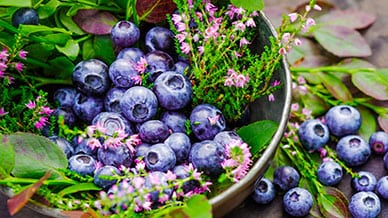Dietary Flavonoids May Help Preserve Lung Health
Flavonoids are a diverse group of plant chemicals, known as phytonutrients, that are found in most all fruits and vegetables. While flavonoids have been known to have a number of health benefits due to their antioxidant powers, new research has shown that they may also play a role in promoting lung health. As we age, lung function naturally declines. In fact, respiratory fitness, or lung health, is one of the main factors that can play a major role in determining a person's lifespan. Consuming flavonoids on a regular basis may help protect lung health as we age by ultimately slowing down the signs of aging on our lungs.
How Aging Affects Lung Health
Aging affects the lungs just as it does all other organs, and there are four major ways in which the function of our lungs decreases as we age.
First and foremost, aging decreases airflow and gas exchange. Secondly, our vital capacity, which is the maximum amount of air that can be inhaled and exhaled in a single stretch, decreases as well, thus we become more prone to taking shallow breaths.
What's more, the respiratory muscles that are responsible for air intake and outflow tend to become weak with growing age, further adding to our inability to breathe deeply. In addition, with exposure to air pollution, our lungs must deal with a plethora of toxins that are not meant to be inhaled. To battle these toxins, our lungs inherently possess a defense mechanism to help clean and protect itself. This defense mechanism consists of tiny, hair-like projections on the cells that line the airway, called cilia, a mucus layer that traps pathogens, and alveolar macrophages, a type of white blood cell. While this three-part respiratory defense system may seem strong, as we age, this defense mechanism weakens and becomes less effective.
Though these aging factors may not seem to pose an immediate threat, the overall lung weakness they create can result in reduced physical capacity, subjecting aging seniors to ailments such as pneumonia and other infections. In addition to older adults, smokers tend to be at the highest risk for these respiratory issues, as their lungs are already subjected to a lot of toxins.
What are Flavonoids?
Flavonoids are natural substances found in plants that are responsible for a plant's pigmentation or color. These phytochemicals belong to the polyphenol class of chemicals. Flavonoids can be found in various parts of a plant, such as stems, fruits, flowers, bark, vegetables, roots or leaves, and are an indispensable part of many pharmaceutical and nutraceutical products and applications. Here is an excellent resource for the various groups of flavonoids.
Flavonoids Protect Lung Health
 Flavonoids have many protective properties. Two of the main characteristics of flavonoids that benefit our overall health are their anti-inflammatory and anti-oxidizing properties.
Flavonoids have many protective properties. Two of the main characteristics of flavonoids that benefit our overall health are their anti-inflammatory and anti-oxidizing properties.
Here are few ways in which lung health is improved and protected by flavonoids:
- They are anti-inflammatory.
When our bodies are exposed to infection or trauma, inflammation occurs. Inflammation is a defense mechanism that can be helpful to a certain extent, but when it becomes chronic it can worsen the overall condition of any organ. The anti-inflammatory properties of flavonoids help to decrease and protect against the harsh effects of inflammation. There are a wide variety of phytochemicals that fit into the flavonoid category. Among them is anthocyanin. Anthocyanin has been shown to help protect against inflammation in the lungs. As mentioned above, inflammation can pose a serious threat to the human body. Spirometry, a test which measures the volume of air inhaled and exhaled, was used extensively to find out whether flavonoids aided in increasing lung health. According to a study, the percentage of people who consumed the highest amount of the flavonoid anthocyanin through the food they ate exhibited better lung health. - They possess antioxidant properties.
While our bodies undergo stresses that result in inflammation, at the same time, our bodies are also subjected to free radical damage on a daily basis, thus these antioxidant properties battle free radicals and help neutralize their damaging effects. Our lungs often breathe in polluted air which is full of free radicals. Free radical discharge in the body tends to heavily damage the lungs in particular. As people age, their lung capacity decreases as well. In such cases, damaged lungs further lessen the amount of air that can be utilized by the body. However, regular intake of flavonoids helps to protect against the oxidative damage from free radicals, helping to preserve lung health. - Flavonoids help protect against obesity.
Many studies have proven that obesity leads to decreased air intake and reduced lung function and capacity. How can flavonoids affect obesity risk? The anti-inflammatory properties of flavonoids prevent the excess production of leptin. Leptin is a hormone which suppresses the appetite. Increased production of leptin has been linked with obesity. Flavonoids tend to decrease this hormone's production. As people age and lung capacity naturally decreases, obesity can worsen their condition. In such cases, flavonoids are of a great benefit to aging people. - They help diabetic patients breathe better.
As if anti-oxidant, anti-inflammatory and healthy weight properties weren't enough benefits, a study has proposed that diabetic patients tend to exhibit decreased air intake capacity. This decrease in pulmonary function can be mitigated by the intake of flavonoids. On the other hand, those who consume flavonoid-rich foods tend to have better vascular function and a lower risk of diabetes.
How to Reap the Health Benefits of Flavonoids
Though flavonoids are present in many fruits and vegetables, for those who do not consume enough fruits and vegetables on a daily basis, supplementation should be considered. In fact, a wide variety of the flavonoids that support good health are available in supplement form.
Also, green tea provides a good dose of flavonoids and has other great health benefits as well. It's important to note that the flavonoids present in most fruits and vegetables are very sensitive in nature; when these flavonoid-rich foods are cooked, it's possible that most of the flavonoids may be lost.





